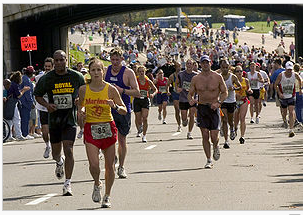 I had planned on running in the Jerusalem Half Marathon last week. Instead, I found myself running half way around the world in a frantic attempt to kiss my father one last time before he died.
I had planned on running in the Jerusalem Half Marathon last week. Instead, I found myself running half way around the world in a frantic attempt to kiss my father one last time before he died.
The sprint from the diagnosis of cancer to his final days went alarmingly fast – less than three weeks from start to finish. There was barely any time to think through treatment courses, let alone work out emotions that were hitting our family like blunt objects hurled with laser precision.
One moment he couldn’t breathe, the next he was starting chemo and the oncologist was optimistic. Then he stopped eating.
When the call finally came to “get on a plane now,” my mother wasn’t sure he’d even know who I was when I got there….if I arrived in time. Over Shabbat, he had told my mother he just wanted to go to sleep and not wake up.
It all happened so fast. Just 4 days earlier, my mother had asked the doctor if her son in Israel should come. No, the doctor said. He has time.
As my Delta flight wound its way to the U.S., I prepared myself by pouring through “Wrestling with the Angel,” a pluralistic compilation of essays about Jewish approaches to death and morning edited by Rabbi Jack Riemer. I took notes to share with my family when I arrived in preparation for what now seemed inevitable.
Q: Why do we tear kri’ah, an article of clothing, when a person dies? A: It’s a very graphic act that serves to remind the mourner of the importance of life at a time of loss.
Q: How should one act at a shiva (bereavement) visit? A: Don’t turn it into a cocktail party with finger food where the mourners have to play “host” and everyone avoids talking about what’s most important.
Q: Why is it traditional to put stones not flowers on the gravesite? A: Stones are permanent and more appropriate for preserving memory. Flowers wither away.
With my head swimming in Jewish thought and the exhaustion of being up all night, I switched on my cell phone as the plane landed in New York. It rang almost immediately. Jody was on the line.
While I was in the air, Dad had died, she said. My mother, my brother and his wife Jen were there at the end and saw him take his last breath. Jody was crying. “I’m so sorry,” she said.
Somehow I had a sinking feeling that this would happen, that he would pass away while I was en route. I reviewed my flight options. The only way I could have gotten there in time was if I’d rushed to the airport immediately after I spoke to my mother at 10:15 PM on Saturday night and went from counter to counter looking for a open seat on the midnight flight to New York before they closed the gates.
In the meantime, I still had another plane trip to go. The next six hours on the way to San Francisco were among the hardest I’ve ever experienced. I was fighting back the tears the whole time, in order not to alarm the flight attendants.
I had so much I had wanted to share with my father. Even if he didn’t understand a word, I wanted to hold his hand, to tell him I could have been a better son, to forgive him for his own shortcomings, to say I love you one more time.
In our last major conversation since the diagnosis, Dad told me that this wasn’t the way he wanted to die. He didn’t want it to be drawn out and painful. He wanted to die at home not in the hospital. And it was too soon. He was only 81. He still had things he wanted to do.
But death of course doesn’t play by a schedule. If there’s anything I’ve learned by the process so far, it’s that we’re not in control. Dad had his expectations of how he’d die; I had my vision of saying goodbye.
Some might say it’s all in God’s hands. I’d simply say it’s not in ours.

